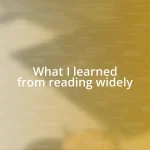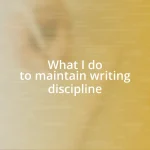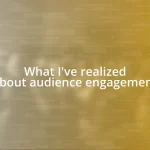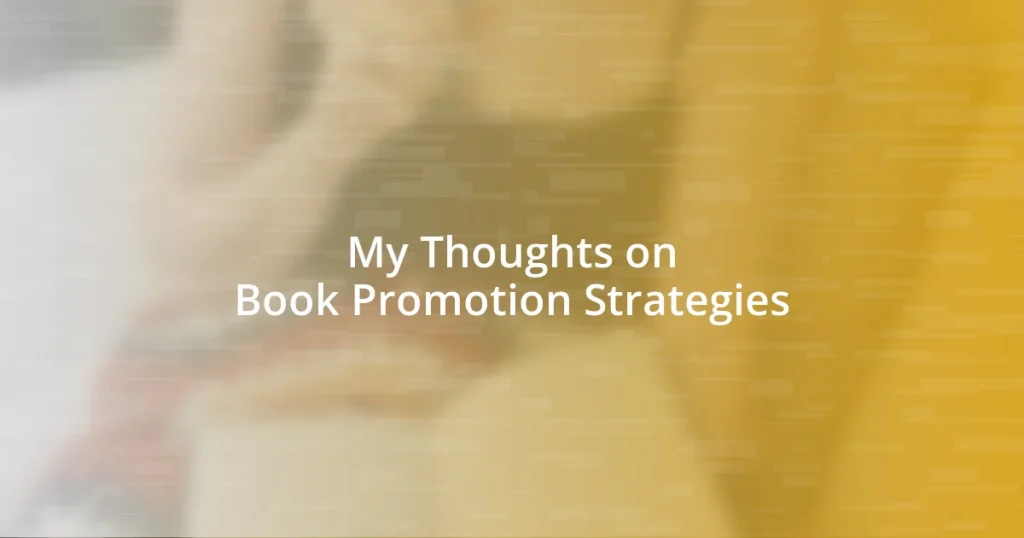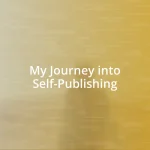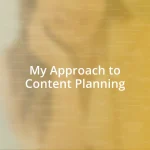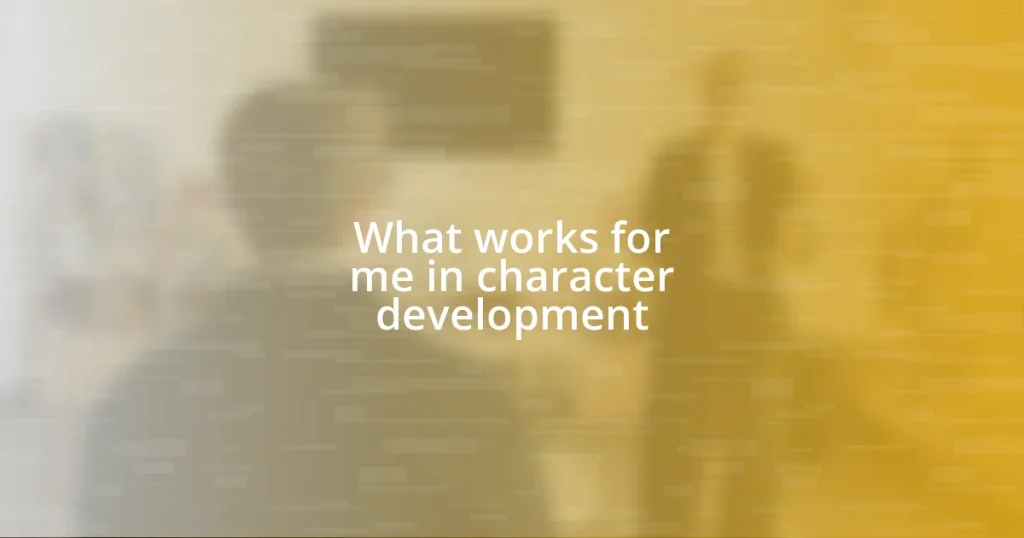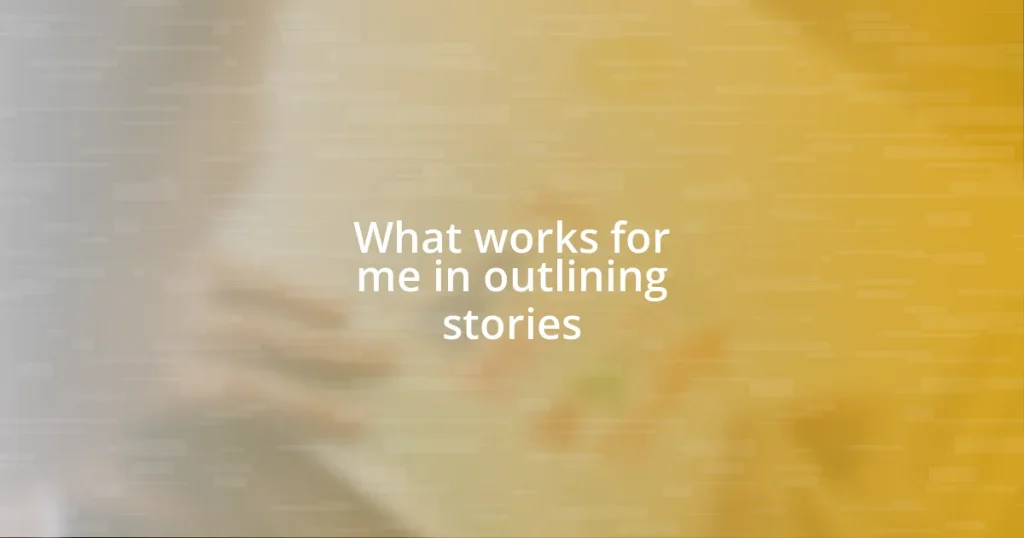Key takeaways:
- Book promotion requires ongoing effort and engagement, rather than treating it as a one-time event to build sustainable interest.
- Defining your target audience by understanding demographics, interests, and reading habits is crucial for effective promotional strategies.
- Utilizing social media authentically and consistently, along with leveraging influencer partnerships, can greatly enhance visibility and reader connections.

Understanding Book Promotion Basics
Understanding the basics of book promotion is essential for any author looking to reach a wider audience. I often think about the moment I realized that simply having a great book wasn’t enough. It was a bit of a wake-up call; how do you expect readers to find you if you don’t actively put your work out into the world?
A common mistake I see among new authors is the assumption that book promotion is a one-time event. In my experience, this mindset can lead to disappointment. If you’re spending just a week on social media or a month on a promotional campaign, you’re likely to miss the opportunity for sustainable interest. Have you ever thought about how consistent engagement can create a loyal readership?
I remember when I attended my first writer’s conference, feeling a mix of excitement and anxiety. Listening to seasoned authors discuss their promotional strategies opened my eyes to the myriad of ways to build a platform. It struck me that successful book promotion often requires a blend of creativity and strategy. How can you ensure your voice stands out in a crowded market? That’s the question every author should keep at the forefront of their minds.

Defining Your Target Audience
To effectively define your target audience, you need to consider who will genuinely connect with your book’s themes and characters. I recall the moment I realized my protagonists weren’t just figments of my imagination; they represented the struggles and aspirations of specific groups of readers. Understanding their backgrounds, interests, and pain points proved invaluable. This exercise in empathy wasn’t just beneficial for writing—it reshaped my promotional strategies.
Here are some key characteristics to explore when defining your target audience:
- Demographics: Age, gender, and location can play a vital role in shaping your marketing message.
- Interests and Hobbies: Knowing what your audience enjoys can guide where to focus your promotion efforts.
- Reading Habits: Understanding how frequently your audience reads and what genres they prefer can help hone your outreach.
- Challenges: Identifying their pain points allows you to position your book as a solution.
- Engagement Platforms: Discovering where your potential readers hang out online can target your advertising effectively.
Ultimately, refining your understanding of your audience is a crucial step in ensuring your book resonates far beyond your initial circle of influence.

Utilizing Social Media Effectively
When it comes to utilizing social media effectively, I’ve found that authenticity is key. I recall a time when I posted a personal story about my writing journey, and the response was overwhelming. Readers appreciated the behind-the-scenes look, which helped to foster a genuine connection. It’s these little nuggets of authenticity that resonate and can spark conversations, leading to greater visibility for your work.
Additionally, choosing the right platforms is crucial. Not every social media outlet is a good fit for book promotion. For example, I have seen success on Instagram with visually appealing content and engaging stories, while Twitter’s fast-paced environment has been perfect for sharing thoughts and updates. Have you ever analyzed which platforms yielded the best engagement for your posts? Crafting your content specifically for each platform can enhance your reach exponentially.
Finally, consistency is vital in a successful social media strategy. I remember when I committed to posting regularly, my audience grew noticeably over time. Building a routine not only keeps your readers engaged but also positions you as a reliable source of content. With careful planning and a touch of creative flair, social media can become an invaluable tool in your book promotion arsenal.
| Platform | Strengths |
|---|---|
| Visual storytelling, community engagement | |
| Real-time updates, broad reach | |
| Targeted advertising, group interactions | |
| Longevity of posts, specific interest targeting | |
| TikTok | Viral potential, youth engagement |

Leveraging Influencer Partnerships
When it comes to leveraging influencer partnerships, I’ve learned that authenticity in collaboration is non-negotiable. Recently, I partnered with an Instagram influencer who genuinely loved my book before we collaborated. Seeing her share her honest reaction to my story felt so rewarding, and her genuine excitement translated into new readers eager to explore my work. Have you ever engaged with someone whose passion for your writing sparked a connection that brought in fresh interest?
Finding the right influencers can truly make a difference in your promotional strategy. I remember the first time I approached a book reviewer with a solid following. I was nervous, but her enthusiasm for my genre was palpable. The result? A review that not only highlighted my book’s strengths but also gave readers a direct emotional punch that resonated perfectly with my target audience. It’s all about aligning with influencers who share your vision and values, right?
Lastly, nurturing these relationships is vital for long-term success. I stay in touch with influencers even after the initial promotion, often sharing snippets from my upcoming projects. This continued interaction reminds them of our collaboration and keeps my work on their radar, showing that I value our connection beyond just business. How often do you reach out after a successful promotional event? Building a community can amplify your reach in ways you may not have initially imagined.

Creating Engaging Content Strategies
Creating engaging content strategies requires a blend of creativity and insight. I remember crafting a blog post that combined my personal writing struggles with practical tips for aspiring authors. The response was incredible—readers felt connected to my journey and appreciated the actionable advice. Have you ever thought about how intertwining your story with informative content could resonate with your audience?
In my experience, using multimedia elements like videos or infographics can significantly enhance content engagement. I once created a short video where I read an excerpt from my book, accompanied by visuals that reflected its themes. The interaction was magical—people left comments about how the visuals deepened their understanding of the text. Have you ever explored how different formats can bring your writing to life in fresh ways?
Consistency in your messaging matters too. When I focused on a specific theme throughout my content—like the power of perseverance in writing—it created a cohesive narrative that intrigued my audience. It’s remarkable how a clear focus can lead followers to explore more of your work. How often do you reflect on the themes that resonate with your readers? Keeping that line of communication open can keep your audience coming back for more.

Measuring Promotion Success
Measuring the success of your book promotion efforts is both an art and a science. I’ve learned to track specific metrics like engagement rates, clicks, and conversions, which helps me understand what resonates with my audience. For instance, after a recent virtual launch, I scrutinized the spike in my website traffic and noticed a direct correlation to the promotional posts shared on social media. Have you ever taken a moment to celebrate those little victories that indicate your strategy is working?
Feedback from readers is another invaluable metric. I remember hosting a Q&A session after releasing my latest book, where several participants expressed how they found my book through social media promotions. Their heartfelt messages fueled my motivation, and it reminded me just how powerful direct interaction can be. What feedback mechanisms have you put in place to tap into your readers’ experiences?
Analyzing sales figures is essential as well, but I opt for a broader view by looking at trends rather than just single data points. For example, while reviewing my sales data post-campaign, I noticed an upward trajectory that extended beyond the campaign’s end. It suggested ongoing interest, possibly driven by word-of-mouth. Isn’t it fascinating how a cohesive promotion can sow the seeds for sustained interest? Understanding these dynamics gives me insights that can be utilized for future strategies, allowing me to refine my approach continually.

Adjusting Strategies for Better Results
Adjusting strategies is key to getting the results you want in book promotion. I remember a campaign where I initially focused heavily on Instagram, but the engagement didn’t match my expectations. After some reflection, I pivoted to include platforms like Pinterest, where I showcased visually appealing book graphics. The response was overwhelming. Have you ever considered switching platforms to meet your audience right where they hang out?
Furthermore, I find that experimenting with different types of messaging can lead to surprising outcomes. For a recent promotion, I tested heartfelt messages against a more straightforward approach. To my delight, the heartfelt posts that shared my personal connection to the book received far more engagement. This revelation made me wonder—how often do you dive deep into your emotional connection with your work while promoting it?
Lastly, I learned the importance of being flexible in timing. Once, I scheduled a promotional push during a holiday weekend, thinking it would capture attention. However, the response was underwhelming. After that, I switched my efforts to a quieter week, and the results improved significantly. It made me think — does timing play a larger role in your promotions than you realize? Adapting your strategies not only shows responsiveness to the market but can also significantly enhance your promotional results.


